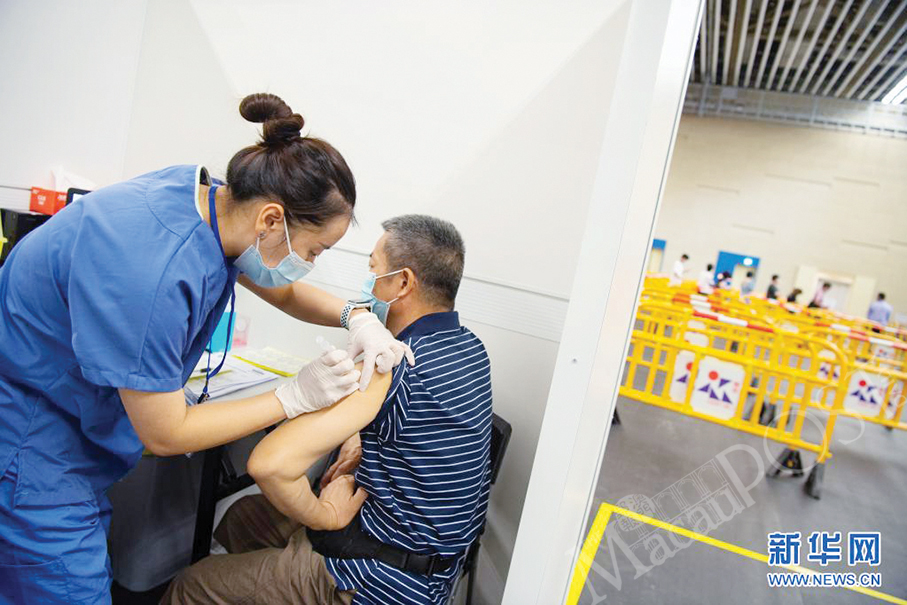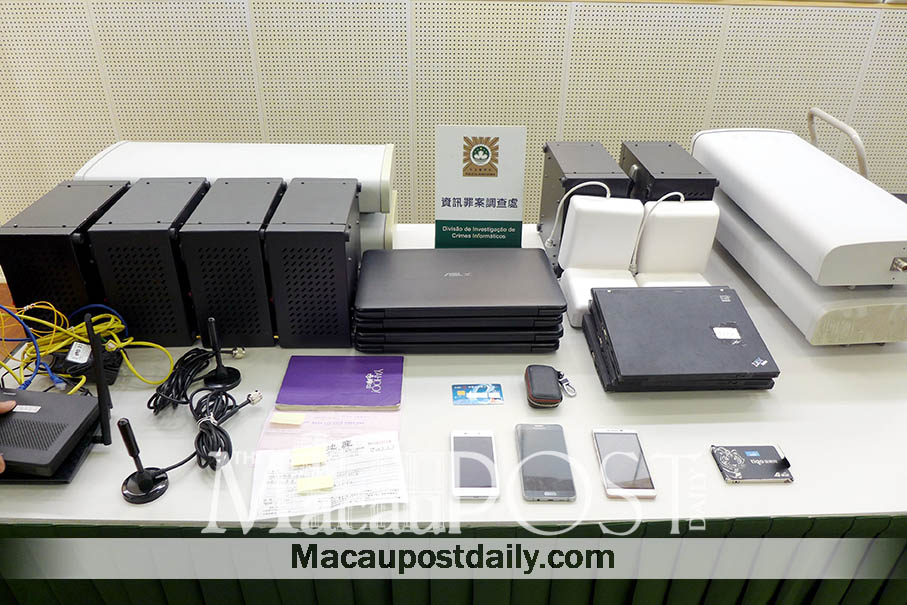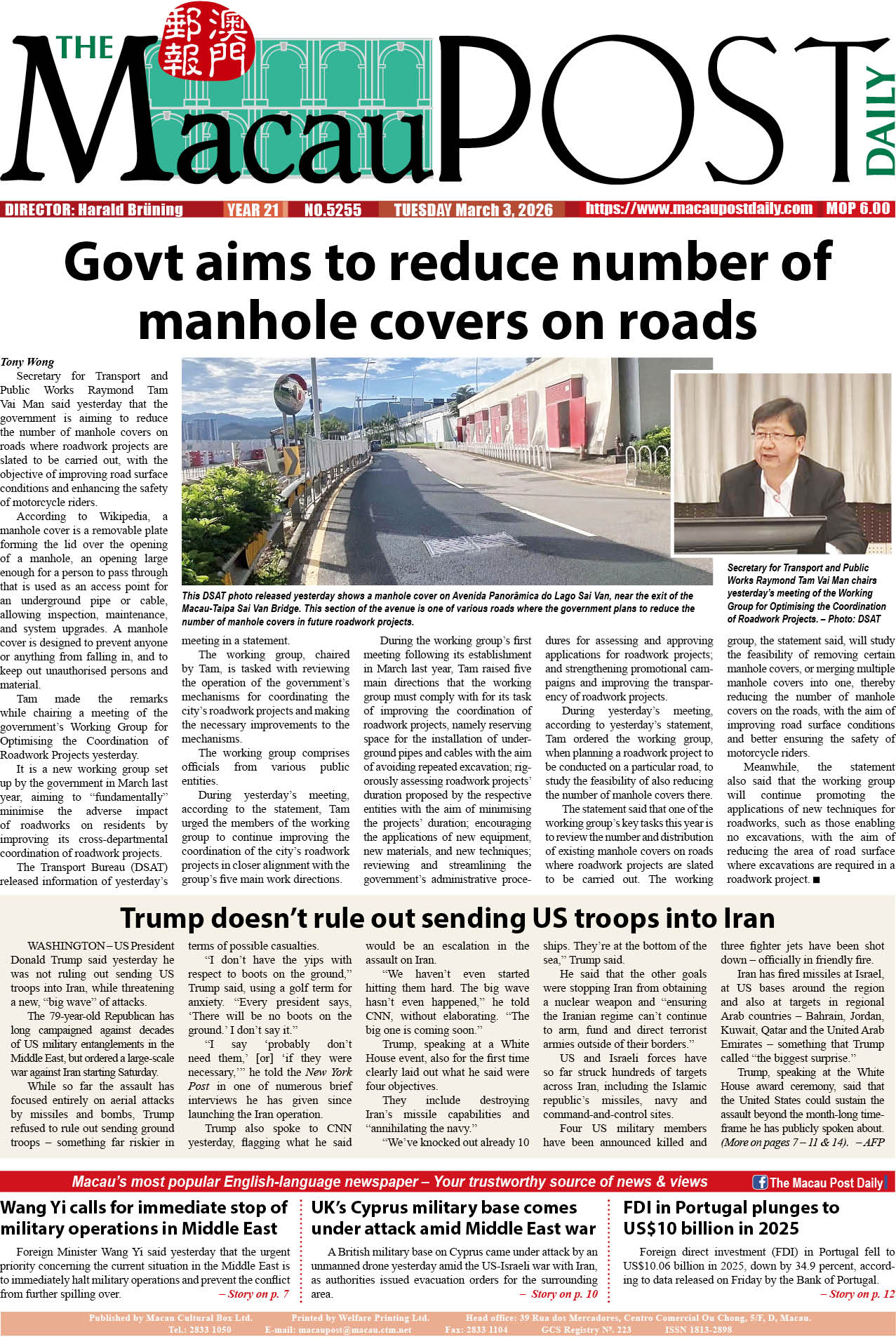Addressing yesterday’s press conference about Macau’s novel coronavirus situation, Health Bureau (SSM) Control of Communicable Diseases and Surveillance of Diseases Department Coordinator Leong Iek Hou underlined the “consistent and ideal” increase in Macau’s COVID-19 vaccination rate, which stood at 65.98 percent as of 4 p.m. yesterday, over recent weeks, but lamented that the inoculation rate among senior citizens is still low.
Consequently, Leong said that the government’s most important objective right now was to increase the senior citizens’ COVID-19 inoculation rate.
In addition to senior citizens, according to Leong, the COVID-19 vaccination rate amongst teenagers is also still low.
Leong reported Macau’s latest COVID-19 vaccination rates for different age groups during yesterday’s press conference. As of 4 p.m. yesterday, according to Leong, the vaccination rates for the different age groups were: 45.8 percent for those aged between 12 and 19; 87.2 percent among those aged from 20 to 29; 90.1 percent for those aged between 30 and 39; 94.3 percent among those aged from 40 to 49; and 75.7 percent for those aged between 50 and 59.
According to Tai, as of 4 p.m. yesterday the COVID-19 vaccination rate among senior citizens stood at 52.4 percent for those aged between 60 and 69; 30.7 percent among those aged from 70 to 79; and 8.3 percent for those aged 80 or over.
Macau’s COVID-19 vaccination rates among young and middle-aged people are high, reaching around 80 to 90 percent, but concerning senior citizens, Leong said, the older they are, the lower their inoculation rates are.
Leong noted that those aged 12 or over can now choose between the two types of COVID-19 vaccines currently available in Macau, China’s Sinopharm inactivated vaccine and Germany’s BioNTech mRNA vaccine, urging parents to take their teenage children to get inoculated against COVID-19 as soon as possible.
Both Sinopharm and BioNTech shots are administered to those aged 12 or over in Macau. The Health Bureau lowered the minimum age for the administration of Sinopharm vaccine from 18 to 12 from last week.
Leong also said that the COVID-19 vaccinate rate among all Health Bureau staff, i.e., both medical and administrative ones – stood at 85 percent last week.
Seniors incur much higher risk than youngsters if catching COVID-19
Leong also reaffirmed that research studies worldwide have indicated that senior citizens who have been infected with COVID-19 will run the risk of suffering a serious condition or even dying from the disease 60 to 100 times more than young people who have caught the novel coronavirus. In case of COVID-19 infection, according to Leong, senior citizens who have not been inoculated against the novel coronavirus will run the risk of suffering a serious condition or dying from the disease nine times more than their peers who have been vaccinated against COVID-19.
As of 4 p.m. yesterday, 790,170 doses of COVID-19 vaccine had been administered to 451,006 people in Macau, comprising 107,776 who had received their first jab and 343,230 who had received their second jab.
A total of 21 adverse events were reported in the past 24 hours (until 4 p.m. yesterday). The total number of adverse events since the start of the vaccination drive stood at 3,304, or 0.42 percent of the total number of jabs, including eight serious cases.
Leong also said that the government has resumed its outreach COVID-19 vaccination programme for local schools following yesterday’s resumption of in-class lessons.
Leong also said that the Health Bureau had launched its outreach COVID-19 inoculation drive last week for senior citizens living in retirement homes.
Macau has not recorded a new local COVID-19 case for 16 consecutive days after the latest case was confirmed on October 9. Macau’s COVID-19 tally stands at 77, without any fatalities.
Possible 3rd COVID-19 jab
Meanwhile, Leong also reaffirmed that the Health Bureau is still studying the possibility of administering a third COVID-19 vaccine dose as a booster jab in Macau by keeping a close eye on the latest findings of research studies on the matter around the world.
Leong pointed out that according to the World Health Organisation (WHO), the administration of a third COVID-19 vaccine dose normally has two types of situations. In the first situation, the immunity (antibody levels) of those who have received the two required COVID-19 jabs will gradually decrease after a period of time, in which case a third dose could significantly boost their immunity level against the novel coronavirus, i.e., a booster jab, according to Leong.
In the second situation, the latest findings of research studies worldwide have indicated that those with a very weak immune system still could not generate enough antibodies after receiving the two required COVID-19 jabs, because of which a third dose would be needed for them, according to Leong.
Leong underlined that Macau would only roll out a third COVID-19 vaccine dose after the wider availability of research findings worldwide verifying the effectiveness and safety of the administration of a third jab.
The Health Bureau said earlier this month that if Macau rolls out a third COVID-19 vaccine dose, the booster shots would be administered to certain target groups first, such as 1) those with a chronic disease, 2) those with weakened immune system whose antibody levels would normally drop more quickly than others after having been fully vaccinated against COVID-19, and 3) those working in occupations that are potentially subject to a higher risk to the novel coronavirus, such as medical workers and those working in the frozen food sector.
Meanwhile, local media outlets reported yesterday that Zhuhai has now launched its programme to administer a third COVID-19 vaccine dose as a booster to three groups of people, namely 1) those working in occupations that are potentially subject to a higher COVID-19 risk, such as those working at border checkpoints, cross-border drivers and medical workers, 2) those performing duties ensuring the basic operation of civil society, such as police officers, firefighters, those working in the public utility sector and those working in the transport sector, and 3) those aged 60 or over who normally have a weaker immune system.
Ruling out lifting entry ban on foreigners
Meanwhile, Leong also reaffirmed that Macau will need to continue with its entry ban on foreign nationals without a Macau ID card – which has been in force since March last year, considering the limited capacity of city’s medical system.
Leong pointed out that the COVID-19 pandemic is still very serious in foreign countries, because of which if Macau were to allow foreign visitors to come to Macau – even with quarantine in place, this would significantly increase the number of new COVID-19 cases in Macau, which would put a heavy burden on the city’s medical system.
Consequently, Leong emphasised that Macau will maintain its policy of only allowing foreign nationals without a Macau ID card to enter Macau in special circumstances or in the public interest.
Leong underlined that Macau’s entry ban on foreign nationals without a Macau ID card is an important element of its COVID-19 prevention and control principle of guarding against imported cases.
Contact tracing
Meanwhile, Leong also reaffirmed that the Health Bureau aims to roll out a new function on the Macau Health Code as soon as possible that will enable residents to record their whereabouts on their smartphones.
Leong said that the Health Bureau is carrying out testing on the new contact tracing function in the final stage of the function’s development work.
Leong reaffirmed that the bureau has not changed its design of the new contact tracing function on the Macau Health Code system, according to which the users’ travel history records would only be stored on their smartphones after they scan a QR code at the city’s various premises and venues, merely aiming to help them record their whereabouts.
According to Leong, the design means that residents can choose whether or not to scan the QR codes at the various premises and venues they are visiting. Consequently, she said, the new contact tracing function on the Macau Health Code is different from contact tracing functions on health code systems in the mainland, which are operated based on big data technology.

This file photo shows a health worker administering a Sinopharm COVID-19 jab to a man at the Mong Ha inoculation facility on June 21, the first day of its operation. Photo: Xinhua







